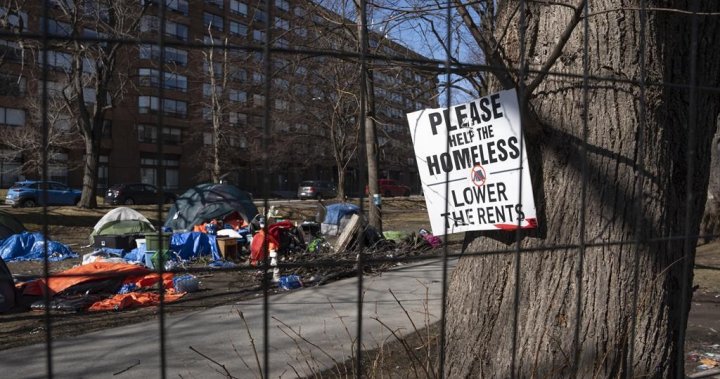Breaking News
Affordability or bust: Nova Scotia election campaign all about cost of living – Halifax

A significant shift has occurred in Nova Scotia following the Progressive Conservatives’ landslide victory in the 2021 election, focusing primarily on healthcare.
Although the healthcare system is still facing challenges, with over 145,114 individuals awaiting a family doctor, the issue of affordability has risen in importance for voters alongside healthcare as the top concern leading up to the November 26 election.
“People’s ability to afford essentials like groceries and housing surpasses almost everything else,” remarked Jeffrey MacLeod, a political science professor at Mount Saint Vincent University.
Robert Huish, a political scientist at Dalhousie University, concurred, stating, “Nova Scotia used to have a lower cost of living compared to other regions in the country. However, we now see rental prices that compete with Toronto and surpass Montreal.”
At the midpoint of the provincial election, Tim Houston and the Progressive Conservatives maintain a lead in the polls, with a recent survey by Abacus Data showing the Tories at 45% support, while the NDP and Liberals vie for second place at 26% and 25% respectively.
MacLeod and Huish suggest that in order for the opposition parties to catch up or for the Tories to maintain or expand their majority, they must address the affordability crisis.
“If the opposition parties can effectively argue that the Houston government is responsible for many of the issues related to income inequality and the housing crisis due to a lack of foresight, it could spell trouble for the Tories,” MacLeod warned.
“This could significantly impact the election outcome and potentially cost them their government if they’re not careful,” he added.

Get breaking National news
For news impacting Canada and around the world, sign up for breaking news alerts delivered directly to you when they happen.
The Affordable Housing Association of Nova Scotia reported that as of October 30, there were 1,335 individuals experiencing homelessness in the Halifax area, a significant increase from the 417 people on the list when Houston took office. Additionally, approximately 7,020 households are on Nova Scotia’s wait-list for public housing, with half of them being seniors.
An August report from the Canadian Centre for Policy Alternatives revealed that the living wage in Halifax has reached $28.30 per hour, while the minimum wage in Nova Scotia sits at $15.20 per hour.
“The surge in rental costs post-pandemic has left many individuals in precarious situations,” Huish explained, highlighting the shortage of affordable housing and a rental vacancy rate of about one percent in Nova Scotia.
MacLeod pointed out that over the past three and a half years, the Progressive Conservative government has aimed for significant population growth, yet housing, infrastructure, and healthcare accessibility have not kept pace. In October 2021, Houston’s government unveiled a plan to double the province’s population to two million by 2060.
Last week, Liberal Leader Zach Churchill criticized the Tories’ immigration policies, claiming they hinder the government’s ability to provide adequate housing and services. Churchill noted that the Tories exceeded the Immigration Department’s limit by welcoming nearly 12,000 immigrants through its nominee program in the most recent fiscal year.
Churchill emphasized the need for responsible immigration practices. In response, Houston defended his population doubling goal as a “stretch goal.”
If elected, Churchill’s party plans to establish a rent bank, reduce the harmonized sales tax, and implement other measures to address affordability challenges.
Claudia Chender’s NDP has proposed various housing and affordability initiatives, including rent control, promoting prefabricated housing, and increasing loans for home down payments.
MacLeod criticized the Tories for relying too heavily on the private sector to build homes, resulting in units that are unaffordable for many. Houston highlighted existing measures to assist low-income Nova Scotians, including a home heating rebate and a one-point HST cut.
The Tory platform includes a pledge to cap electricity rate increases and raise the minimum wage to $16.50 per hour by next year.
MacLeod stressed the importance of proven strategies to combat poverty and ensure access to housing and essentials, emphasizing that tax cuts alone are insufficient.
The Tory leader’s plans to address affordability include raising the minimum wage and implementing various government initiatives.
“While government can’t solve every issue, there are specific actions they can take,” Houston stated.

© 2024 The Canadian Press
-

 Destination8 months ago
Destination8 months agoSingapore Airlines CEO set to join board of Air India, BA News, BA
-

 Breaking News10 months ago
Breaking News10 months agoCroatia to reintroduce compulsory military draft as regional tensions soar
-

 Gadgets3 months ago
Gadgets3 months agoSupernatural Season 16 Revival News, Cast, Plot and Release Date
-

 Tech News12 months ago
Tech News12 months agoBangladeshi police agents accused of selling citizens’ personal information on Telegram
-

 Productivity11 months ago
Productivity11 months agoHow Your Contact Center Can Become A Customer Engagement Center
-

 Gadgets3 weeks ago
Gadgets3 weeks agoFallout Season 2 Potential Release Date, Cast, Plot and News
-

 Breaking News10 months ago
Breaking News10 months agoBangladesh crisis: Refaat Ahmed sworn in as Bangladesh’s new chief justice
-

 Toys12 months ago
Toys12 months ago15 of the Best Trike & Tricycles Mums Recommend

























